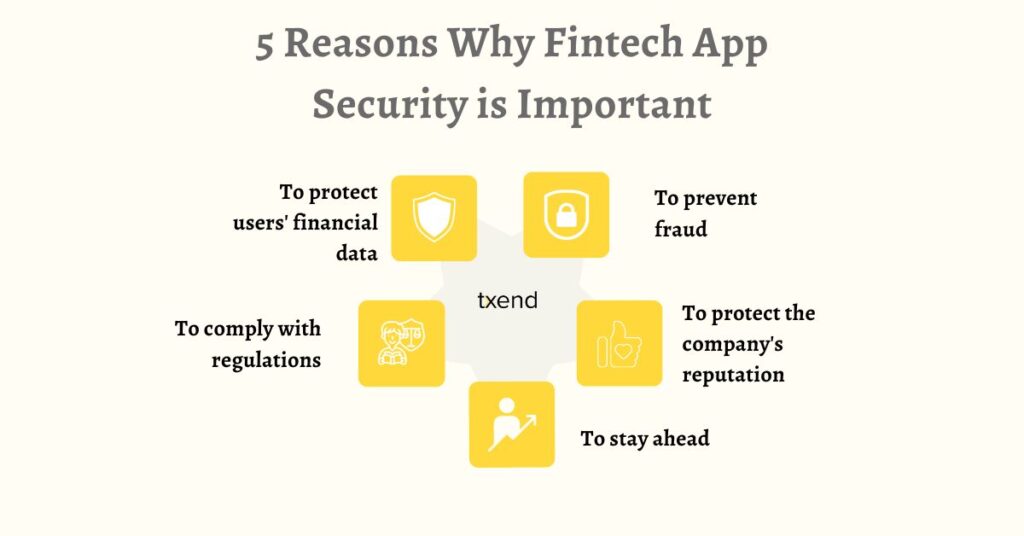
Overview of Fintech App Security
A Fintech app uses financial technology to offer services to its users.
Fintech apps are financial products that use technology to improve access to financial services and compete with traditional financial institutions.
Fintech apps provide efficient ways to access and manage finances. They often offer alternative financial systems, such as blockchain and cryptocurrencies.
Here are some examples of FinTech apps:
- Mobile banking apps
- Peer-to-peer lending apps
- Cryptocurrency exchanges
- Robo-advisors
- Investment apps
Fintech apps are growing in popularity as they offer a more convenient and affordable way to manage finances. However, it is essential to note that FinTech apps are still relatively new and have some security risks. Users should be aware of these risks and take steps to protect their financial data when using FinTech apps.
Fintech app security protects financial technology applications from unauthorized access, disclosure, modification, or destruction. Fintech apps handle a lot of sensitive financial data, so it is essential to take steps to protect them from hackers.
Some security measures include using strong passwords, encrypting data, and using multi-factor authentication.
5 Reasons Why Fintech App Security Is Important

Here are the five reasons why Fintech app security is essential:
1. To Protect Users’ Financial Data:
Fintech apps process and manage a significant amount of sensitive financial data. Fintech apps must implement security measures for the safety of sensitive data.
This data is a valuable target for hackers, who could use it to commit identity theft, make unauthorized purchases, or even take over bank accounts.
2. To Prevent Fraud:
If a FinTech app is not secure, hackers could steal users’ data and use it to commit fraud. This fraud could include identity theft, unauthorized purchases, or even taking over bank accounts.
Fintech companies need to take steps to prevent fraud, such as by using robust authentication methods and monitoring for suspicious activity.
3. To Comply With Regulations:
Fintech companies in many countries are subject to data security regulations. By implementing strong security measures, they can help and make sure compliance with these regulations, which can protect them from fines and penalties and build trust with users.
4. To Protect The Company’s Reputation:
A data violation or other security incident can damage a FinTech company’s reputation and lose customers. By implementing strong security measures, FinTech companies can help to protect their reputation and stay in business.
5. To Stay Ahead:
The Fintech industry is highly competitive. Fintech companies that can implement strong security measures will be at an advantage over their competitors because they can build trust with customers and attract new users.
Role of Government Regulations
Government rules and regulations play an essential role in ensuring the security of FinTech security apps. By setting standards and requirements for FinTech companies, governments can help to protect consumers from fraud and financial loss.
Some of the key areas that government regulations typically address include:
Data Protection:
Governments typically require FinTech companies to protect customer data with strong security measures. Such measures include encryption, access controls, and auditing.
Cybersecurity:
Governments also require FinTech companies to implement cybersecurity measures to protect their systems and networks from attack. Such measures include vulnerability scanning, penetration testing, and incident response plans.
Consumer Protection:
Governments require FinTech companies to provide consumers with clear information about their products and services, including fees, risks, and privacy practices.
Top 10 Common Security Threats to Fintech Apps

1. Phishing Attacks:
When clicked, the emails or text messages will often carry a link that will take the victim to a dummy website that looks like the actual website. The fake website will then ask the victim to enter their personal information, such as their login credentials or credit card number.
Once the victim enters their login credentials on the fake website, the hacker can steal them.
2. Malware Attacks:
Malware is software designed to harm a computer system. You can install Malware on a computer in various ways, such as clicking on a malicious link, opening an infected attachment, or downloading a file from an untrusted source.
Once you have installed Malware on a computer, it can steal data, damage the system, or even take control of the computer.
3. Data Breaches
Data breaches occur when sensitive data is exposed to unauthorized individuals. Such data breaches can occur in various ways, such as hacking, human error, or system vulnerabilities.
4. API Attacks:
Fintech Apps use API to communicate with other systems. API attacks can steal data, modify data, or disrupt services.
5. Zero-Day Attacks:
Zero-day attacks exploit vulnerabilities in software that the software vendor is unaware of. Zero-day attacks are often challenging to defend against because no patch can fix the vulnerability.
6. Bugs And Vulnerabilities:
Fintech apps are complex pieces of software prone to bugs and vulnerabilities. These bugs and vulnerabilities can be exploited by hackers to gain unauthorized access to the app or to steal data.
7. Human Error:
Human error is a significant factor in many security breaches. Fintech companies need to train their employees on security best practices and how to protect sensitive data.
8. Third-Party Risk:
Fintech apps rely on third-party vendors for payment processing and cloud computing services. These third-party vendors can also be a source of security risk. Fintech companies must carefully vet their third-party vendors and make sure that they have robust security measures.
9. Supply Chain Attacks:
Supply chain attacks target a Fintech company’s supply chain. Such attacks can involve the company’s suppliers, partners, or customers. A supply chain attack aims to gain access to the company’s systems or data through a less secure point in the supply chain.
10. Ransomware Attacks:
Ransomware attacks encrypt a victim’s secure information and demand a ransom to decrypt it. Ransomware attacks are often targeted at Fintech companies because they have sensitive data to ask for a high ransom payment in its exchange.
Tips To Protect Users Data And Prevent Fraud

The security risks associated with FinTech apps are constantly evolving. Fintech companies must stay current on the latest threats and apply new security measures as needed. By learning more about the following nine tips, FinTech companies can help to protect users’ data and prevent fraud.
1. Strong Encryption:
All critical data, for example, credit card numbers and passwords, should be encrypted. Such encryption will make it much more difficult for hackers to steal this data if they can breach your app’s security.
2. Implement Multi-Factor Authentication:
Multi-factor authentication requires users to provide two or more pieces of evidence to authenticate themselves, such as a password and a code sent to their phone. This makes it much more difficult for hackers to gain unauthorized access to your app.
3. Regularly Update Your App:
Software vulnerabilities are security risks that hackers can use. By continuously updating your software, you can help to protect yourself from the latest threats.
4. Monitor For Suspicious Activity:
Use security tools to monitor your app for suspicious activity, such as unauthorized login attempts or significant funds transfers. Such monitoring will help you to identify and respond to security threats quickly.
5. Educate Your Users:
Ensure they know the security risks associated with using your app and how to protect themselves. The education includes using strong passwords, being careful about what information they share online, and reporting suspicious activity to you.
6. Use A Secure Development Lifecycle:
The closed development cycle is a process that helps ensure security is built into your app from the start. The SDLC includes threat modeling, vulnerability scanning, and penetration testing.
7. Use A Secure Cloud Provider:
If you use a cloud provider for your FinTech app, you should ensure that the vendor has robust security measures. Look for a provider offering encryption, access control, and auditing features.
8. Use A Secure API Gateway:
An API gateway is a piece of software between your app and the internet. It can protect your app from API attacks by filtering traffic and blocking malicious requests.
9. Use A Fraud Detection System:
A fraud detection system can help to identify and prevent fraudulent transactions. Such Fraud detection systems use machine learning to analyze typed data and identify the historical patterns that may indicate fraud.
10. Use A Security Awareness Training Program
A security awareness training program can help your employees to understand the security risks of their work and how to protect themselves. This includes teaching them about phishing attacks, Malware, and social engineering.
Top Five Fintech Security Technologies:

1. Strong Encryption:
Encryption converts data into an unreadable format by unauthorized users. Encryption is an essential security measure that FinTech companies can implement. Information about you, such as your credit card numbers and passwords, should always be encrypted.
2. Multi-Factor Authentication:
Multi-factor authentication (MFA) requires users to provide two or more pieces of evidence to authenticate themselves, such as a password and a code sent to their phone. This makes it much more difficult for hackers to gain unauthorized access to an account.
3. Regular Security Updates:
Software companies regularly release security patches to fix vulnerabilities in their software. FinTech apps are no exception. Hackers can use such vulnerabilities to gain access to your financial data. Regularly updating your FinTech apps can protect the data from the latest threats.
4. Suspicious Activity Monitoring:
Fintech companies should use security tools to monitor their apps for suspicious activity, such as unauthorized login attempts or significant funds transfers. Strict tracking will help them to identify and respond to security threats quickly.
5. Biometric Authentication:
Biometric authentication uses unique physical features, for example, fingerprints or facial recognition, to authenticate users. Biometrics is a more secure way to authenticate users than passwords, as it is much more difficult for hackers to steal biometric data.
Past Fintech Security Breaches
Capital One Data Breach (2019):
In March 2019, Capital One, a major credit card company, experienced a data threat that opened the personal information of over 100 million customers.
The breach was due to the misconfiguration in Capital One’s cloud environment. The misconfiguration allowed an intruder to access a database containing Capital One customers’ personal information, including names, addresses, and credit card numbers.
This was found by a security researcher who encountered the misconfiguration and notified Capital One. Capital One reimbursed all affected customers for the cost of identity theft protection.
Equifax Data Breach (2017):
Equifax, a central credit reporting agency, suffered a data breach in September 2017 that exposed the personal information of over 147 million Americans. This included names, addresses, Social Security numbers, and credit card numbers.
A vulnerability in Equifax’s software caused the breach. The vulnerability allowed an intruder to access a database containing Equifax customers’ personal information, including names, Social Security numbers, and birthdates.
The breach was not noticed until months after it occurred, and the U.S. government fined Equifax $700 million. Equifax offered affected customers a year of free credit monitoring and identity theft protection.
Coinbase Data Breach (2020):
In June 2020, Coinbase, a cryptocurrency exchange, experienced a data breach that exposed the personal information of over 600,000 customers. The breach was caused because of a phishing attack that targeted Coinbase employees.
The phishing attack tricked Coinbase employees into clicking on a malicious link, which allowed the intruder to access the personal information of Coinbase customers, including names, email addresses, and phone numbers. Coinbase reimbursed all affected customers for the cost of identity theft protection.
Robinhood Data Breach (2021):
In December 2021, Robinhood, a stock trading app, experienced a data breach that exposed the personal information of over 7 million customers. The breach was caused by a misconfiguration in Robinhood’s cloud environment.
The misconfiguration allowed an intruder to access the personal information of Robinhood customers, including names, email addresses, and zip codes. Robinhood offered affected customers a year of free credit monitoring and identity theft protection.
PayPal Data Breach (2018):
In October 2018, PayPal, a payment experienced a data breach that exposed the personal information of over 140 million customers.
A vulnerability in PayPal’s software caused the breach. The vulnerability allowed an intruder to access the personal information of PayPal customers, including names, email addresses, and payment information. PayPal reimbursed all affected customers for the cost of identity theft protection.
Fintech App Security Testing Tools
FinTech app security testing is essential to protect customer data and financial assets from cyberattacks. Various security testing tools are available to help FinTech companies identify and mitigate app vulnerabilities.
Some of the most popular FinTech app security testing tools include:
OWASP ZAP:
A free, open-source penetration testing tool for web applications.
Burp Suite:
A commercial penetration testing tool that offers a good range of features, including vulnerability scanning, fuzzing, and scripting.
AppSec Cloud:
A cloud-based security testing platform that provides automated and manual testing services for FinTech apps.
AppScan:
A commercial security testing tool that offers a variety of features, including static analysis, dynamic analysis, and API testing.
Veracode:
A cloud-based security testing platform that offers automated and manual testing services for FinTech apps. The choice of security testing tool will depend on the specific needs of the FinTech company.
How Can Txend Help You Build A Secured FinTech App?

Providing Expertise In FinTech Security:
Txend deeply understands the security risks associated with FinTech apps and can help design and implement security measures appropriate for your app.
Developing Secure Software:
Txend has a team of experienced developers skilled in developing secure software. They can help to build your Fintech app in a way that minimizes the risk of security vulnerabilities.
Testing For Security Vulnerabilities:
Txend has a team of security testers who can test your app for security vulnerabilities. The testing will help to identify and fix any vulnerabilities before hackers can exploit them.
Providing Security Awareness Training:
Txend can provide security awareness training to your employees. This training will help them understand the security risks associated with their work and how to protect themselves and the company.
Providing 24/7 Security Monitoring:
Txend can provide 24/7 security monitoring for your app. This monitoring will help to detect and respond to security threats quickly.
Frequently Asked Questions
Financial apps handle sensitive financial data like credit card numbers and bank account information. If this data is compromised, it could lead to identity theft, fraud, and other financial losses. That’s why financial apps need to have decisive security steps in place to protect user data.
Cyber security in FinTech protects financial technology (FinTech) systems and data from unauthorized access that may lead to fraud, modification, or destruction. FinTech companies must have robust cyber security measures to protect their customer’s data and prevent fraud.
Fintech security issues will be solved by combining government regulation, industry collaboration, and technological innovation. Government regulation can help to set minimum security standards for FinTech companies.
Industry collaboration can help to share best practices and develop new security solutions. Technological innovation can help to develop new ways to protect financial data from unauthorized access.
Conclusion | Fintech App Security
Fintech App security is a critical issue for the financial industry. Fintech companies handle sensitive financial data; if compromised, it could lead to theft, fraud, and other financial losses. That’s why FinTech companies must have strong precautions to protect user data.
By implementing the security as mentioned above measures, FinTech companies can help to protect user data and prevent financial losses.
It is important to note that no single security measure can guarantee a Fintech app’s security. Fintech companies need to implement a multi-layered security approach that includes a variety of security measures.

if you work as freelancer if any buyer message you on fiverr, upwork, freelancer or anywhere Quick Alert for Freelancers and Entrepreneurs Software will instantly notified you by Phone call.